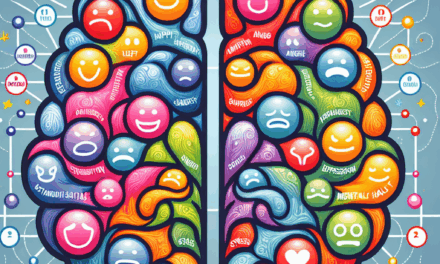Understanding Mindfulness-Based Cognitive Therapy (MBCT) and Its Benefits
Mindfulness-Based Cognitive Therapy (MBCT) is an innovative therapeutic approach that combines cognitive behavioral techniques with mindfulness strategies. Developed in the 1990s by Zindel Segal, Mark Williams, and John Teasdale, MBCT was designed primarily to prevent relapse in individuals who have experienced recurrent depression. This article delves into the intricacies of MBCT, exploring its principles, techniques, benefits, and applications in various mental health contexts.
1. The Foundations of Mindfulness-Based Cognitive Therapy
To understand MBCT, it is essential to explore its foundational elements, which include mindfulness and cognitive therapy. Each component plays a crucial role in the overall effectiveness of the approach.
1.1 What is Mindfulness?
Mindfulness is the practice of being fully present and engaged in the moment, without judgment. It involves observing thoughts, feelings, and bodily sensations as they arise, allowing individuals to develop a greater awareness of their internal experiences. This practice has roots in Buddhist meditation but has been adapted for therapeutic use in Western psychology.
- Awareness: Mindfulness encourages individuals to notice their thoughts and feelings without becoming overwhelmed by them.
- Non-judgment: Practicing mindfulness involves accepting experiences as they are, rather than labeling them as good or bad.
- Present Moment Focus: Mindfulness emphasizes living in the present, which can help reduce anxiety about the future and regrets about the past.
1.2 The Role of Cognitive Therapy
Cognitive therapy, particularly Cognitive Behavioral Therapy (CBT), focuses on identifying and changing negative thought patterns that contribute to emotional distress. It operates on the premise that our thoughts influence our feelings and behaviors. By challenging and reframing these thoughts, individuals can alter their emotional responses and improve their mental health.
- Cognitive Restructuring: This technique involves identifying distorted thinking patterns and replacing them with more balanced thoughts.
- Behavioral Activation: Encouraging individuals to engage in activities that promote positive emotions and reduce avoidance behaviors.
- Problem-Solving Skills: Teaching individuals effective strategies to cope with challenges and stressors in their lives.
1.3 The Integration of Mindfulness and Cognitive Therapy
MBCT integrates mindfulness practices with cognitive therapy techniques to create a holistic approach to mental health. This combination allows individuals to develop a deeper awareness of their thoughts and feelings while simultaneously learning to challenge and change negative patterns. The goal is to cultivate a sense of self-compassion and acceptance, which can lead to improved emotional regulation and resilience.
Research has shown that MBCT can be particularly effective for individuals with recurrent depression, as it helps them recognize early signs of relapse and develop healthier coping strategies. By fostering a mindful attitude, individuals can learn to observe their thoughts without becoming entangled in them, reducing the likelihood of depressive episodes.
2. The Structure of MBCT Programs
MBCT is typically delivered in a structured format, often over eight weekly sessions. Each session builds upon the previous one, gradually introducing participants to mindfulness practices and cognitive techniques.
2.1 Session Breakdown
Each session of an MBCT program typically includes a combination of guided mindfulness practices, group discussions, and cognitive exercises. The following is a general outline of what participants can expect:
- Session 1: Introduction to Mindfulness – Participants learn about the principles of mindfulness and engage in basic mindfulness exercises.
- Session 2: The Body Scan – A guided body scan meditation helps participants develop awareness of bodily sensations and tension.
- Session 3: Mindfulness of Breath – Participants practice focusing on their breath as a way to anchor their attention in the present moment.
- Session 4: Recognizing Automatic Thoughts – This session introduces cognitive techniques for identifying and challenging negative thought patterns.
- Session 5: Mindfulness in Daily Life – Participants learn how to incorporate mindfulness practices into their everyday routines.
- Session 6: Dealing with Difficult Emotions – Strategies for managing challenging emotions are discussed, along with mindfulness practices to support emotional regulation.
- Session 7: Self-Compassion – Participants explore the concept of self-compassion and its role in mental health.
- Session 8: Moving Forward – The final session focuses on integrating mindfulness into daily life and developing a personal plan for continued practice.
2.2 Group Dynamics and Support
MBCT is often conducted in group settings, which can enhance the therapeutic experience. Group dynamics provide participants with a sense of community and support, allowing them to share their experiences and learn from one another. This collective environment fosters a sense of belonging and reduces feelings of isolation, which can be particularly beneficial for individuals struggling with depression or anxiety.
Research has shown that group therapy can lead to improved outcomes for participants, as they often feel more comfortable discussing their challenges in a supportive environment. Additionally, hearing others’ experiences can provide new insights and perspectives on one’s own struggles.
2.3 The Role of Homework Assignments
Homework assignments are an integral part of MBCT, as they encourage participants to practice mindfulness techniques and cognitive strategies outside of the group sessions. These assignments may include:
- Daily Mindfulness Practice: Participants are encouraged to set aside time each day for mindfulness meditation or other practices.
- Journaling: Keeping a journal to track thoughts, feelings, and mindfulness experiences can help participants gain insight into their patterns.
- Mindful Activities: Engaging in everyday activities mindfully, such as eating or walking, to reinforce the practice.
By incorporating these assignments into their daily lives, participants can deepen their understanding of mindfulness and its application in managing their mental health.
3. The Benefits of MBCT
MBCT offers a wide range of benefits for individuals struggling with mental health issues, particularly depression and anxiety. Research has demonstrated its effectiveness in reducing symptoms and preventing relapse.
3.1 Reducing Symptoms of Depression
One of the primary benefits of MBCT is its ability to reduce symptoms of depression. Studies have shown that MBCT can be as effective as traditional antidepressant medications for preventing relapse in individuals with recurrent depression. A meta-analysis published in the journal Psychological Bulletin found that MBCT significantly reduced the risk of relapse compared to standard care.
Participants in MBCT learn to recognize early warning signs of depression, such as negative thought patterns and emotional triggers. By developing mindfulness skills, they can respond to these signs with greater awareness and self-compassion, reducing the likelihood of falling back into depressive episodes.
3.2 Enhancing Emotional Regulation
MBCT also promotes emotional regulation, helping individuals manage their emotions more effectively. By cultivating mindfulness, participants learn to observe their emotions without becoming overwhelmed by them. This increased awareness allows for healthier responses to difficult emotions, reducing impulsive reactions and promoting a sense of calm.
Research has shown that individuals who practice mindfulness report greater emotional resilience and improved coping skills. A study published in the journal Mindfulness found that participants who completed an MBCT program experienced significant improvements in emotional regulation and overall well-being.
3.3 Improving Anxiety Management
In addition to its benefits for depression, MBCT has been shown to be effective in managing anxiety. The mindfulness techniques taught in MBCT can help individuals become more aware of their anxious thoughts and feelings, allowing them to respond with greater clarity and calmness.
A study published in JAMA Psychiatry found that MBCT significantly reduced anxiety symptoms in participants with generalized anxiety disorder. By learning to observe their thoughts without judgment, individuals can break the cycle of anxiety and develop healthier coping strategies.
3.4 Fostering Self-Compassion
Self-compassion is a key component of MBCT, as it encourages individuals to treat themselves with kindness and understanding, especially during difficult times. Research has shown that self-compassion is associated with lower levels of anxiety and depression, as well as greater overall well-being.
Participants in MBCT learn to cultivate self-compassion through mindfulness practices and cognitive reframing techniques. By developing a more compassionate relationship with themselves, individuals can reduce self-criticism and promote a healthier self-image.
3.5 Enhancing Overall Well-Being
Beyond its specific benefits for depression and anxiety, MBCT has been shown to enhance overall well-being. Participants often report improvements in life satisfaction, quality of life, and interpersonal relationships. The skills learned in MBCT can be applied to various aspects of life, promoting a greater sense of balance and fulfillment.
A study published in the journal Clinical Psychology Review found that individuals who completed an MBCT program experienced significant improvements in overall well-being, including increased mindfulness, self-compassion, and emotional regulation.
4. Applications of MBCT in Different Populations
MBCT has been successfully applied to various populations and mental health conditions, demonstrating its versatility as a therapeutic approach.
4.1 MBCT for Recurrent Depression
As originally designed, MBCT is particularly effective for individuals with a history of recurrent depression. Research has consistently shown that MBCT can significantly reduce the risk of relapse in this population. A landmark study published in The Lancet found that MBCT reduced the risk of relapse by 50% compared to standard care.
Participants learn to recognize early warning signs of depression and develop strategies to manage their symptoms proactively. This proactive approach empowers individuals to take control of their mental health and reduce the likelihood of future episodes.
4.2 MBCT for Anxiety Disorders
MBCT has also been adapted for individuals with anxiety disorders, including generalized anxiety disorder, social anxiety disorder, and panic disorder. Research has shown that MBCT can effectively reduce anxiety symptoms and improve overall functioning.
By teaching individuals to observe their anxious thoughts without judgment, MBCT helps break the cycle of anxiety and promotes healthier coping strategies. A study published in Behaviour Research and Therapy found that participants with anxiety disorders who completed an MBCT program experienced significant reductions in anxiety symptoms and improved quality of life.
4.3 MBCT for Chronic Pain Management
MBCT has been explored as a complementary approach for individuals dealing with chronic pain. The mindfulness techniques taught in MBCT can help individuals develop a different relationship with their pain, reducing the emotional distress associated with it.
A study published in the journal Pain found that participants with chronic pain who completed an MBCT program reported significant reductions in pain-related distress and improvements in overall well-being. By cultivating mindfulness, individuals can learn to observe their pain without becoming overwhelmed by it, leading to greater acceptance and resilience.
4.4 MBCT for Stress Management
In today’s fast-paced world, stress management is a critical concern for many individuals. MBCT offers valuable tools for managing stress and promoting overall well-being. By teaching mindfulness techniques, individuals can develop greater awareness of their stress triggers and learn to respond with greater calmness and clarity.
A study published in the journal Stress and Health found that participants who completed an MBCT program reported significant reductions in perceived stress and improvements in coping skills. The skills learned in MBCT can be applied to various stressors, from work-related challenges to personal relationships.
4.5 MBCT for Adolescents and Young Adults
MBCT has also been adapted for adolescents and young adults, addressing the unique challenges faced by this population. Research has shown that mindfulness practices can be particularly beneficial for young people dealing with stress, anxiety, and depression.
A study published in the journal Journal of Adolescence found that adolescents who participated in an MBCT program reported significant reductions in anxiety and depressive symptoms. By equipping young people with mindfulness skills, MBCT can promote resilience and emotional well-being during a critical developmental period.
5. Challenges and Considerations in MBCT
While MBCT offers numerous benefits, there are also challenges and considerations to keep in mind when implementing this therapeutic approach.
5.1 Accessibility and Availability
One of the primary challenges of MBCT is accessibility. While many mental health professionals are trained in cognitive therapy, fewer are trained in mindfulness practices. This can limit the availability of MBCT programs, particularly in underserved areas.
Efforts are being made to increase accessibility through online programs and self-help resources. However, the effectiveness of these resources may vary, and individuals may benefit more from guided instruction in a group setting.
5.2 Individual Differences in Response
Not all individuals respond to MBCT in the same way. Factors such as personality traits, previous experiences with mindfulness, and the severity of mental health conditions can influence the effectiveness of the approach. Some individuals may find it challenging to engage in mindfulness practices, particularly if they have a history of trauma or severe anxiety.
It is essential for mental health professionals to assess individual needs and tailor the approach accordingly. Some individuals may benefit from additional support or alternative therapeutic modalities alongside MBCT.
5.3 Commitment to Practice
MBCT requires a commitment to regular practice, both during and after the program. Individuals who struggle to maintain a consistent mindfulness practice may not experience the full benefits of MBCT. It is crucial for participants to recognize that mindfulness is a skill that takes time and effort to develop.
Encouraging participants to set realistic goals for their practice and providing ongoing support can help foster commitment and motivation.
5.4 Cultural Considerations
Cultural factors can also influence the effectiveness of MBCT. Mindfulness practices may not resonate with all individuals, particularly those from cultures that prioritize different values or approaches to mental health. It is essential for mental health professionals to consider cultural context when implementing MBCT and to adapt practices as needed.
5.5 Research Limitations
While research supports the effectiveness of MBCT, there are limitations to consider. Many studies rely on self-reported measures, which can be subject to bias. Additionally, more research is needed to explore the long-term effects of MBCT and its effectiveness across diverse populations.
Continued research and evaluation are essential for refining MBCT and ensuring its accessibility and effectiveness for all individuals seeking support for their mental health.
Conclusion
Mindfulness-Based Cognitive Therapy (MBCT) is a powerful therapeutic approach that combines mindfulness practices with cognitive techniques to promote mental health and well-being. Its structured format, emphasis on group support, and focus on self-compassion make it a valuable option for individuals struggling with depression, anxiety, and other mental health challenges.
The benefits of MBCT are well-documented, including reductions in symptoms of depression and anxiety, enhanced emotional regulation, and improved overall well-being. Its versatility allows it to be applied to various populations, from adolescents to individuals dealing with chronic pain.
While there are challenges to consider, such as accessibility and individual differences in response, the potential benefits of MBCT make it a compelling option for those seeking to improve their mental health. As research continues to evolve, MBCT may become an increasingly integral part of mental health care, offering individuals the tools they need to navigate life’s challenges with greater awareness and resilience.
In summary, MBCT represents a holistic approach to mental health that empowers individuals to cultivate mindfulness, challenge negative thought patterns, and foster self-compassion. By integrating these practices into their lives, individuals can enhance their emotional well-being and build a foundation for lasting mental health.





